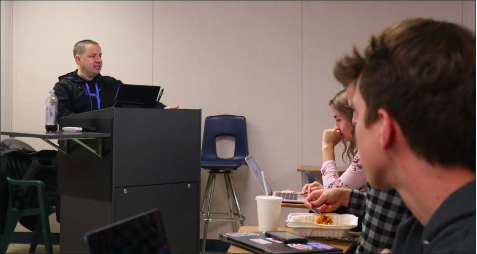(This story was originally published in print on Nov. 29, 2018)
“I do not know where to begin. I just do not.” Do you feel this way after engaging in a conversation, especially when it turns to a sensitive issue? Do you, like many others I know, sometimes feel like you have to hide what you really think and feel for fear that it will spark an argument whenever issues about politics, gender, immigration or any other contentious topic arise? This phenomenon has been around for quite some time, as Deborah Tannen wrote in “The Argument Culture” back in 1999. This “argument culture” seems here to stay and has become quite destructive. So one could then ask, how can I engage in conversations over contentious issues yet still be civil despite heavily disagreeing? Let me give you some tips.
#1: YOU DO NOT HAVE TO AGREE.
Two things are important to note about this. First, if I reject an argument you make, I am not rejecting you. Yet so many of us seem to hold to positions where we accept very few alternatives to what we actually believe. The Social Judgement Theory calls this ego involvement. My research suggests that ego involvement often results in personal rejection when one hears another utter an opinion that is different. We need less of our ego and less of our identity wrapped up in every opinion we have.
The second is this—if we agree on everything, one of us is not necessary. This should free us to be able to say things like “I disagree” and not feel the need to try to persuade the other person of the error of that person’s ways. We can disagree on 99 percent of the issues and still be friends.
#2: VALUE CLARITY OVER AGREEMENT.
This is scary given our “argument culture,” but it is much needed. It is more helpful to listen and ask questions than to try to build a case for why you are right. Ask people to define what they mean when they say something that rubs you the wrong way. Seek to understand what they are saying and, hopefully, why they are saying it. See if you can repeat their view back to them using different words than what they used. And finally, invite them to correct your understanding. This invaluable skill will help diffuse tensions and give you time and space to share differing perspectives because you took the time to understand the other perspective first.
#3: REFRAIN FROM AD HOMINEMS.
This should be a no-brainer, but I have to say it. I have been falsely accused, even at Biola, of being sexist or bigoted, all because of a disagreement. Attacking the character of the person you disagree with neither strengthens your argument nor makes your position more persuasive. In fact, it reveals a weakness in your logic as you turn to verbal aggression rather than to civility to settle disagreements.
The more we follow these guidelines, especially as believers, the more we can create discussions that enrich our lives and expand our understandings. And this can all happen even when we disagree.
Daniel Elliott is an associate professor of communications studies and the director of forensics at Biola University.







